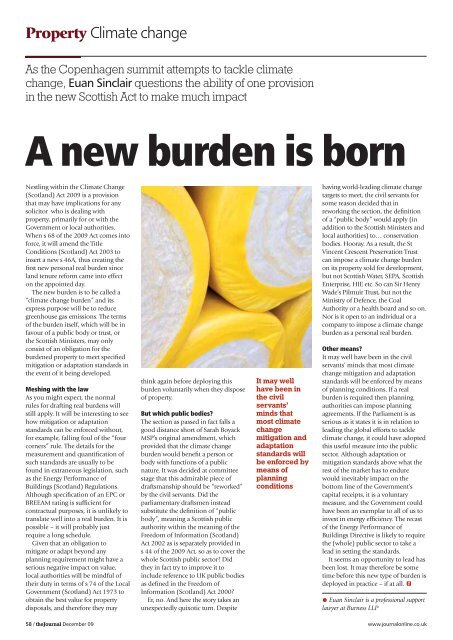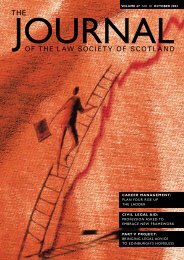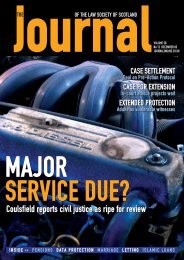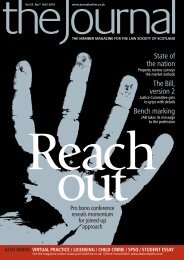Professional briefing - The Journal Online
Professional briefing - The Journal Online
Professional briefing - The Journal Online
You also want an ePaper? Increase the reach of your titles
YUMPU automatically turns print PDFs into web optimized ePapers that Google loves.
Property Climate change<br />
As the Copenhagen summit attempts to tackle climate<br />
change, Euan Sinclair questions the ability of one provision<br />
in the new Scottish Act to make much impact<br />
A new burden is born<br />
Nestling within the Climate Change<br />
(Scotland) Act 2009 is a provision<br />
that may have implications for any<br />
solicitor who is dealing with<br />
property, primarily for or with the<br />
Government or local authorities.<br />
When s 68 of the 2009 Act comes into<br />
force, it will amend the Title<br />
Conditions (Scotland) Act 2003 to<br />
insert a new s 46A, thus creating the<br />
first new personal real burden since<br />
land tenure reform came into effect<br />
on the appointed day.<br />
<strong>The</strong> new burden is to be called a<br />
“climate change burden” and its<br />
express purpose will be to reduce<br />
greenhouse gas emissions. <strong>The</strong> terms<br />
of the burden itself, which will be in<br />
favour of a public body or trust, or<br />
the Scottish Ministers, may only<br />
consist of an obligation for the<br />
burdened property to meet specified<br />
mitigation or adaptation standards in<br />
the event of it being developed.<br />
Meshing with the law<br />
As you might expect, the normal<br />
rules for drafting real burdens will<br />
still apply. It will be interesting to see<br />
how mitigation or adaptation<br />
standards can be enforced without,<br />
for example, falling foul of the “four<br />
corners” rule. <strong>The</strong> details for the<br />
measurement and quantification of<br />
such standards are usually to be<br />
found in extraneous legislation, such<br />
as the Energy Performance of<br />
Buildings (Scotland) Regulations.<br />
Although specification of an EPC or<br />
BREEAM rating is sufficient for<br />
contractual purposes, it is unlikely to<br />
translate well into a real burden. It is<br />
possible – it will probably just<br />
require a long schedule.<br />
Given that an obligation to<br />
mitigate or adapt beyond any<br />
planning requirement might have a<br />
serious negative impact on value,<br />
local authorities will be mindful of<br />
their duty in terms of s 74 of the Local<br />
Government (Scotland) Act 1973 to<br />
obtain the best value for property<br />
disposals, and therefore they may<br />
58 / the<strong>Journal</strong> December 09<br />
think again before deploying this<br />
burden voluntarily when they dispose<br />
of property.<br />
But which public bodies?<br />
<strong>The</strong> section as passed in fact falls a<br />
good distance short of Sarah Boyack<br />
MSP’s original amendment, which<br />
provided that the climate change<br />
burden would benefit a person or<br />
body with functions of a public<br />
nature. It was decided at committee<br />
stage that this admirable piece of<br />
draftsmanship should be “reworked”<br />
by the civil servants. Did the<br />
parliamentary draftsmen instead<br />
substitute the definition of “public<br />
body”, meaning a Scottish public<br />
authority within the meaning of the<br />
Freedom of Information (Scotland)<br />
Act 2002 as is separately provided in<br />
s 44 of the 2009 Act, so as to cover the<br />
whole Scottish public sector? Did<br />
they in fact try to improve it to<br />
include reference to UK public bodies<br />
as defined in the Freedom of<br />
Information (Scotland) Act 2000?<br />
Er, no. And here the story takes an<br />
unexpectedly quixotic turn. Despite<br />
It may well<br />
have been in<br />
the civil<br />
servants’<br />
minds that<br />
most climate<br />
change<br />
mitigation and<br />
adaptation<br />
standards will<br />
be enforced by<br />
means of<br />
planning<br />
conditions<br />
having world-leading climate change<br />
targets to meet, the civil servants for<br />
some reason decided that in<br />
reworking the section, the definition<br />
of a “public body” would apply (in<br />
addition to the Scottish Ministers and<br />
local authorities) to… conservation<br />
bodies. Hooray. As a result, the St<br />
Vincent Crescent Preservation Trust<br />
can impose a climate change burden<br />
on its property sold for development,<br />
but not Scottish Water, SEPA, Scottish<br />
Enterprise, HIE etc. So can Sir Henry<br />
Wade’s Pilmuir Trust, but not the<br />
Ministry of Defence, the Coal<br />
Authority or a health board and so on.<br />
Nor is it open to an individual or a<br />
company to impose a climate change<br />
burden as a personal real burden.<br />
Other means?<br />
It may well have been in the civil<br />
servants’ minds that most climate<br />
change mitigation and adaptation<br />
standards will be enforced by means<br />
of planning conditions. If a real<br />
burden is required then planning<br />
authorities can impose planning<br />
agreements. If the Parliament is as<br />
serious as it states it is in relation to<br />
leading the global efforts to tackle<br />
climate change, it could have adopted<br />
this useful measure into the public<br />
sector. Although adaptation or<br />
mitigation standards above what the<br />
rest of the market has to endure<br />
would inevitably impact on the<br />
bottom line of the Government’s<br />
capital receipts, it is a voluntary<br />
measure, and the Government could<br />
have been an exemplar to all of us to<br />
invest in energy efficiency. <strong>The</strong> recast<br />
of the Energy Performance of<br />
Buildings Directive is likely to require<br />
the (whole) public sector to take a<br />
lead in setting the standards.<br />
It seems an opportunity to lead has<br />
been lost. It may therefore be some<br />
time before this new type of burden is<br />
deployed in practice – if at all.<br />
Euan Sinclair is a professional support<br />
lawyer at Burness LLP<br />
www.journalonline.co.uk










